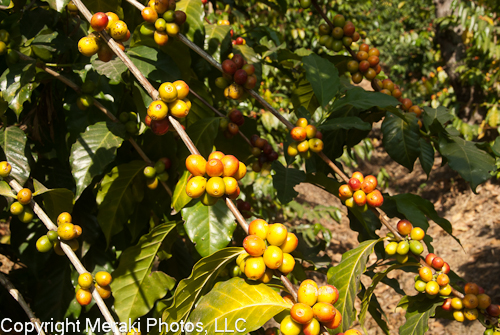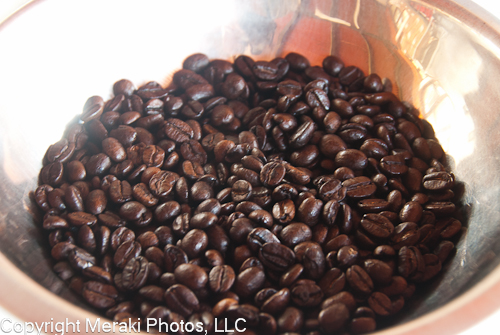 Have you ever wondered how much effort and time goes into making your morning cup o’ joe? Have you ever wondered how many coffee trees are required to support your habit? Me neither. But I was fascinated to learn the answers to these questions when I toured La Azotea, an organic coffee farm in the small town of Jocotenango, just outside of Antigua. I went for the sole purpose of tasting some really good coffee, and I walked away with a new appreciation of every cup of good coffee I drink.
Have you ever wondered how much effort and time goes into making your morning cup o’ joe? Have you ever wondered how many coffee trees are required to support your habit? Me neither. But I was fascinated to learn the answers to these questions when I toured La Azotea, an organic coffee farm in the small town of Jocotenango, just outside of Antigua. I went for the sole purpose of tasting some really good coffee, and I walked away with a new appreciation of every cup of good coffee I drink.
One coffee tree produces 6.5 pounds of “coffee cherry” fruit, and by the end of the process, that only produces 1 pound of roasted coffee. And it takes 3 years from planting a coffee tree for it to start producing coffee cherry. Think of how much coffee we drink around the world and how many coffee plants must exist to support our coffee habit. It’s an industry bigger than I ever imagined and it supports so many workers. And in poorer countries, most of the work is done by hand or with more primitive equipment, so it requires even more workers. One can assume that the main reason a cup of coffee is so cheap is because those coffee farm workers, typically in poor countries, make so little money.
 Of course the poor coffee-producing countries export most of the good stuff, which is why I haven’t been able to find much good coffee here. Most people drink instant coffee, even if you order it in restaurants. On average 70% goes to the US, 15% to Europe, and 5% stays here in Guatemala. La Azotea is an exception, and all of their coffee stays in Guatemala. Guatemala is #7 in production and #3 in quality. In Antigua they produce Arabic coffee, which means it is shade-grown and is of higher quality. And I could definitely taste the difference; no bitterness at all.
Of course the poor coffee-producing countries export most of the good stuff, which is why I haven’t been able to find much good coffee here. Most people drink instant coffee, even if you order it in restaurants. On average 70% goes to the US, 15% to Europe, and 5% stays here in Guatemala. La Azotea is an exception, and all of their coffee stays in Guatemala. Guatemala is #7 in production and #3 in quality. In Antigua they produce Arabic coffee, which means it is shade-grown and is of higher quality. And I could definitely taste the difference; no bitterness at all.
Check out my photos to see the different steps in the coffee production process. This album also contains photos from my visit to Valhalla Macadamia Nut Farm where everything is processed without chemicals.
Good thing I’m down to a single cup of decaf every couple of days. Don’t you agree?
Impressive. I am currently drinking about 7 cups of fully caffeinated organic Nicaraguan coffee that is free at my hostel. The room costs $7 a night and between the pancakes and coffee included, I’m pretty sure the room is actually free.
A lot of work and a lot of natural resources goes into it, doesn’t it?
Federico recently posted..How to Avoid and Deal with Bed Bug and Mosquito Bites When Traveling on a Budget
“In Antigua they produce Arabic coffee” – Did you mean Arabica?
“which means it is shade-grown and is of higher quality” – Which means its of the Arabica species of plant and considered higher quality yes. Shade grown is a growing technique not a coffee species.
Yes, I was referring to the growing technique. Sorry, my early blog posts were not my best
Stephanie – The Travel Chica recently posted..Foto of the Week from … Rosillas: The Ugliest Dog in South America